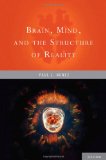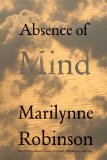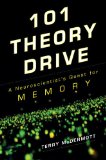April 13, 2010

Due out on April 15 — The Secret Life of the Grown-up Brain: The Surprising Talents of the Middle-Aged Mind by Barbara Strauch (Viking, 2010)
(link for UK)
Product description from the publisher:
A leading science writer examines how the brain’s capacity reaches its peak in middle age
For many years, scientists thought that the human brain simply decayed over time and its dying cells led to memory slips, fuzzy logic, negative thinking, and even depression. But new research from neuroscientists and psychologists suggests that, in fact, the brain reorganizes, improves in important functions, and even helps us adopt a more optimistic outlook in middle age. Growth of white matter and brain connectors allow us to recognize patterns faster, make better judgments, and find unique solutions to problems. Scientists call these traits cognitive expertise and they reach their highest levels in middle age.
In her impeccably researched book, science writer Barbara Strauch explores the latest findings that demonstrate, through the use of technology such as brain scans, that the middle-aged brain is more flexible and more capable than previously thought. For the first time, long-term studies show that our view of middle age has been misleading and incomplete. By detailing exactly the normal, healthy brain functions over time, Strauch also explains how its optimal processes can be maintained. Part scientific survey, part how-to guide, The Secret Life of the Grown-Up Brain is a fascinating glimpse at our surprisingly talented middle-aged minds.
added 4/14/10 – author interview & excerpt at NPR
Comments (0)
- cognitive science,new books
April 11, 2010

Brain, Mind, and the Structure of Reality by Paul L. Nunez (Oxford University Press, 2010)
(link for UK)
Product description from the publisher:
Does the brain create the mind, or is some external entity involved? In addressing this “hard problem” of consciousness, we face a central human challenge: what do we really know and how do we know it? Tentative answers in this book follow from a synthesis of profound ideas, borrowed from philosophy, religion, politics, economics, neuroscience, physics, mathematics, and cosmology, the knowledge structures supporting our meager grasps of reality. This search for new links in the web of human knowledge extends in many directions: the “shadows” of our thought processes revealed by brain imagining, brains treated as complex adaptive systems that reveal fractal-like behavior in the brain’s nested hierarchy, resonant interactions facilitating functional connections in brain tissue, probability and entropy as measures of human ignorance, fundamental limits on human knowledge, and the central role played by information in both brains and physical systems. In Brain, Mind, and the Structure of Reality, Paul Nunez discusses the possibility of deep connections between relativity, quantum mechanics, thermodynamics, and consciousness: all entities involved with fundamental information barriers. Dr Nunez elaborates on possible new links in this nested web of human knowledge that may tell us something new about the nature and origins of consciousness. In the end, does the brain create the mind? Or is the Mind already out there? You decide.
Comments (0)
- cognitive science,consciousness,mind,new books
April 10, 2010

Absence of Mind: The Dispelling of Inwardness from the Modern Myth of the Self (The Terry Lectures Series) by Marilynne Robinson (Yale University Press, 2010)
(link for UK)
Product description from the publisher:
In this ambitious book, acclaimed writer Marilynne Robinson applies her astute intellect to some of the most vexing topics in the history of human thought—science, religion, and consciousness. Crafted with the same care and insight as her award-winning novels, Absence of Mind challenges postmodern atheists who crusade against religion under the banner of science. In Robinson’s view, scientific reasoning does not denote a sense of logical infallibility, as thinkers like Richard Dawkins might suggest. Instead, in its purest form, science represents a search for answers. It engages the problem of knowledge, an aspect of the mystery of consciousness, rather than providing a simple and final model of reality.
By defending the importance of individual reflection, Robinson celebrates the power and variety of human consciousness in the tradition of William James. She explores the nature of subjectivity and considers the culture in which Sigmund Freud was situated and its influence on his model of self and civilization. Through keen interpretations of language, emotion, science, and poetry, Absence of Mind restores human consciousness to its central place in the religion-science debate.
This book is based on the 2009 Terry Lectures — videos available here.
Comments (0)
- Uncategorized
April 7, 2010

101 Theory Drive: A Neuroscientist’s Quest for Memory by Terry McDermott (Pantheon, 2010).
(link for UK)
Product description from the publisher:
An obsessive scientist and his eclectic team of researchers race to discover one of the hidden treasures of neuroscience—the physical makeup of memory—and in the process pursue a pharmaceutical wonder drug.
Gary Lynch is the real thing, the epitome of the rebel scientist: malnourished, contentious, inspiring, explosive, remarkably ambitious, and consistently brilliant. He is one of the foremost figures of contemporary neuroscience, and his decades-long quest to understand the inner workings of the brain’s memory machine has begun to pay off.
Award-winning journalist Terry McDermott spent nearly two years observing Lynch at work and now gives us a fascinating and dramatic account of daily life in his lab—the highs and lows, the drudgery and eureka moments, the agonizing failures. He provides detailed, lucid explanations of the cutting-edge science that enabled Lynch to reveal the inner workings of the molecular machine that manufactures memory. After establishing the building blocks, Lynch then set his sights on uncovering the complicated structure of memory as it is stored across many neurons. Adding practical significance to his groundbreaking work, Lynch discovered a class of drugs that could fix the memory machine when it breaks, drugs that would enhance brain function during the memory process and that hold out the possibility of cures for a wide range of neurological conditions, including Alzheimer’s disease, Parkinson’s disease, and attention deficit hyperactivity disorder. Here is an essential story of science, scientists, and scientific achievement—galvanizing in the telling and thrilling in its far-reaching implications.
See also: Book website
Gary Lynch at UCI (He really does have 101 Theory as an address!)
Comments (0)
- cognitive science,new books






